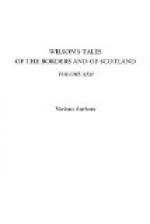“Dreadful imbecility!” he exclaimed, as he threw himself on his chair; “most unaccountable and cruel trifling with a notable visitation of retributive justice, indicated by visible signs of terrible import to him who must bear the cross, and be reconciled to an angry Deity.”
“Against all that may tend to penitence for a past crime,” said I, getting grave, where gravity might avail for good, “I have nothing to say. But Heaven does not work through the mean of man’s deceit and stratagem, and the good that comes of fear goes with returning courage.”
Conscious of getting into a puling humour, I had no objection to an interruption by the entrance of Rogers, who, having finished his work, was probably intent upon the gratification which generally follows.
“I wish you joy of the boy and the diamonds,” he said, as he seized Graeme by the half-palsied hand. “The nurse is reconciled to the omen of a fortune; and surely never was omen more auspicious, for no sooner had the strange indication shown its mute vaticination than it disappeared, that there might be no deduction of beauty from the favourite of the gods.” And drawing, with his lumbering hand, the tumbler near him, he filled it two-thirds up of pure wine, and presently his lips grappled with it like a camel at the bucket in the desert, with such effect that the contents changed vessels in a twinkling.
“Disappeared!” said I musingly.
“Yea, temperance hath her demands on occasions,” said he, thinking I alluded to the exit of the wine, and not the ominous mark; “for there be two kinds of this noble virtue, the jejune and the hearty, whereof the former observes no plethoric gratifications, and the other is not averse to an extreme of cordial indulgence.”
“Disappeared!” said I in a harping way, once again, “and left the skin discoloured.”
“But it was there, and I saw it with these eyes,” cried Graeme, “and the doctor saw it, and Betha, but, thank God, not the mother.”
“The vouchsafing of the eyes is an easy task,” drawled Rogers. “The truth of present fact is of the moment of experience as regards the seer; but, as a moral entity, it never dies. The great Author of nature has his intention in these mysterious signs. We know only that there are two kinds of these God’s finger-touches—the enduring and the evanescent. That we have now witnessed was of the latter kind, which we also call superficial in opposition to the other, which is painted on the rete mucosum, and never goes off. The difference of indications we know not, further than that a mysterious purpose is served by both. But might I ask if ever there was any occasion on which the figure of this card might, as connected with some thrilling incident, have been impressed upon the imagination of the mother?”
“Never,” cried Graeme, as he shook violently.
“Then it betokens fortune to the heir of the Moated Grange,” said Rogers.




